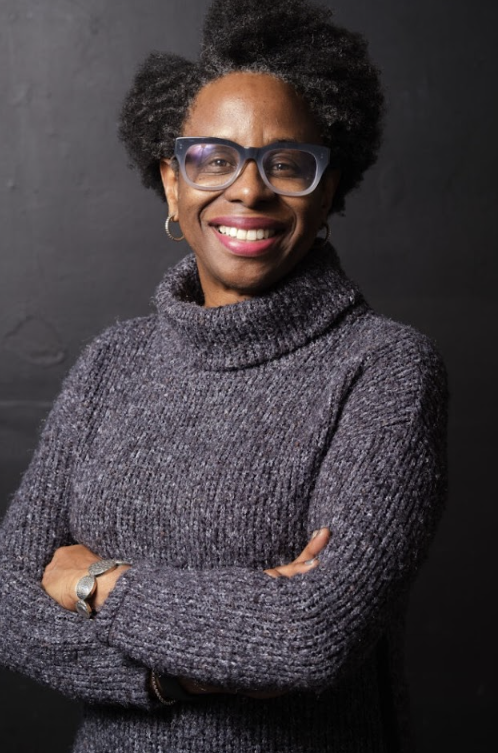Lily Mellitz ’26
Executive Arts Editor
On March 26, Trinity College hosted “Dancing on the Slash: Choreographing a Life as a Black Feminist Artist/Scholar with Lisa Thompson,” an evening of thought-provoking writing and scholarship featuring Dr. Lisa B. Thompson, a celebrated Black feminist professor, author and playwright. The event, presented by the A.K. Smith Reading/Scholar Series and co-sponsored by the Women and Gender Studies, American Studies and the Theater & Dance department, offered attendees an immersive experience blending literature, performance and critical discourse.
Thompson, renowned for her sharp examinations of race, gender, and identity, delivered a compelling lecture accompanied by a dramatic reading from her “Black Feminist Theatrical Trilogy.” The presentation featured selections from three of her acclaimed works:
“The Mamalogues” – A sharp, satirical play that illuminates the experiences of middle-class Black single mothers. Blending humor with poignant storytelling, it examines the struggles of raising children within the intersecting forces of racism, sexism and class disparities, while also honoring the resilience, strength and joy of Black motherhood.
“Single Black Female” – A fast-paced, two-woman comedy that navigates the lives of thirty-something, middle-class African American women as they contend with love, career ambitions and societal stereotypes. Through a series of witty vignettes, the play follows an English professor and a corporate lawyer as they confront dating, friendship, self-worth and the complexities of Black womanhood.
“The Black Feminist Guide to the Human Body” – A choreopoem (a dramatic performance that combines poetry, dance, music and acting) that centers the experiences of Black women, particularly in middle age and beyond. The narrative follows Dr. Beatrice “Bea” Free, a tenured professor crafting a feminist guide to aging. Through a dynamic fusion of movement, music and multimedia, the play affirms the voices and lived realities of Black women, offering a powerful meditation on self-love, validation and embodiment.
Thompson’s reading infused these works with vitality, illuminating the intersections of race, gender and identity while celebrating the humor, resilience and depth of Black womanhood. She was joined by actress Taji Senior and Trinity professor Diana R. Paulin, whose powerful performances added striking emotional depth to the texts. Together, the trio transported the audience into the heart of Thompson’s work, weaving narratives that not only challenge societal norms but also amplify underrepresented voices with nuance and urgency.
Thompson acknowledged two pivotal figures as major influences on her work: Toni Morrison, the acclaimed American novelist, editor and the first Black American to receive the Nobel Prize in Literature in 1993, and August Wilson, the renowned Black American playwright and multiple Pulitzer Prize and Tony Award winner. “[Morrison and Wilson] are guiding figures, whose work I read and continually return to,” Thompson said. “Dancing on the Slash” was inspired, in part, by Wilson’s speech “The Ground on Which I Stand,” particularly his commitment to fully embracing himself as an artist and his unwavering refusal to separate Black life from art.
“His address motivates me to crack my own manifesto as a Black and artist scholar, and echos his drive and desire to live seamlessly, not be torn between the competing parts of who you are,” Thompson said. “And also, I feel a sense of urgency to make sure that I am whole, as I move through the world working with my students, with fellow artists and my colleagues in the theater and the academy.”
Thomspon first learned to “dance on the slash” as a graduate student at the start of her career. A decision to take a playwriting class led to an invitation to join the playwriting community in San Francisco, ultimately inspiring her to write her first play.
“For me, dancing on the slash is refusing the box,” Thompson said. “Maybe some of you students are sitting there [and] trying to decide, should I be a dancer or a CEO? An engineer or a composer? A doctor or a poet?” She went on to highlight the stories of multi-talented artists who didn’t feel the need to choose one path over another and said “I will not pick”.
“But I did try to pick because I didn’t want to be poor,” Thompson said, earning several chuckles. “So I went to law school, got shingles, and left on Halloween.”
Thompson also explored the concept of the “loophole of retreat,” a phrase from Harriet Jacobs’ “Incidents in the Life of a Slave Girl.” Jacobs used it to describe the small, cramped attic where she hid for nearly seven years to escape her enslaver. Symbolically, the phrase represents both physical confinement and a space of resistance, where she gained agency over her own story and future. More broadly, it has been used in literary and critical discourse to describe places of refuge, contemplation and subversive resistance, particularly in Black feminist thought.
“The loophole of retreat possesses an ambiguity of meaning,” Thompson noted. “It extends to the literal loophole, as well as the [conscious] space for Jacobs to have actively acknowledged her own mode of confinement, which constituted an exercise of will and indirect assault against the masteromination of her.”
Drawing from this idea, Thompson reflected on her own navigation of academia and the arts. “I thought of how I used the academy as a loophole of retreat from certain things in the art world,” she said, “but also the art world as a loophole of retreat from certain things in academia. Dancing on the slash as an artist / scholar, […] it’s important to think about what ways you can find safety.”
With warmth, wit and unwavering conviction, Thompson offered a message of empowerment — not just for artists and scholars, but for anyone striving to embrace the fullness of their identity. Her work challenges the notion that we must fit neatly into predefined roles, urging us instead to find liberation in the intersections and what truly inspires us.
“When I was in your seat I was trying to figure out what I should be that’s going to keep me fed and housed,” Thompson said. “That’s not a small question. So I won’t belittle that at all, but I do know this: if the thing that you are doing, you are willing to do when you are hungry and going to the bathroom and you got a headache, that’s your thing. Go to what draws your heart, draws your joy, that you’re willing to fight for, because the money won’t sustain you. Getting a job that people admire won’t sustain you. But the things that really matter to you — and you can determine that — will.”





[…] Studies at Trinity College, recently sat down with the Tripod to discuss her involvement with “Dancing on the Slash: Choreographing a Life as a Black Feminist Artist/Scholar with Lisa Thompson,” a performance lecture by acclaimed playwright and scholar Dr. Lisa B. Thompson. The conversation […]